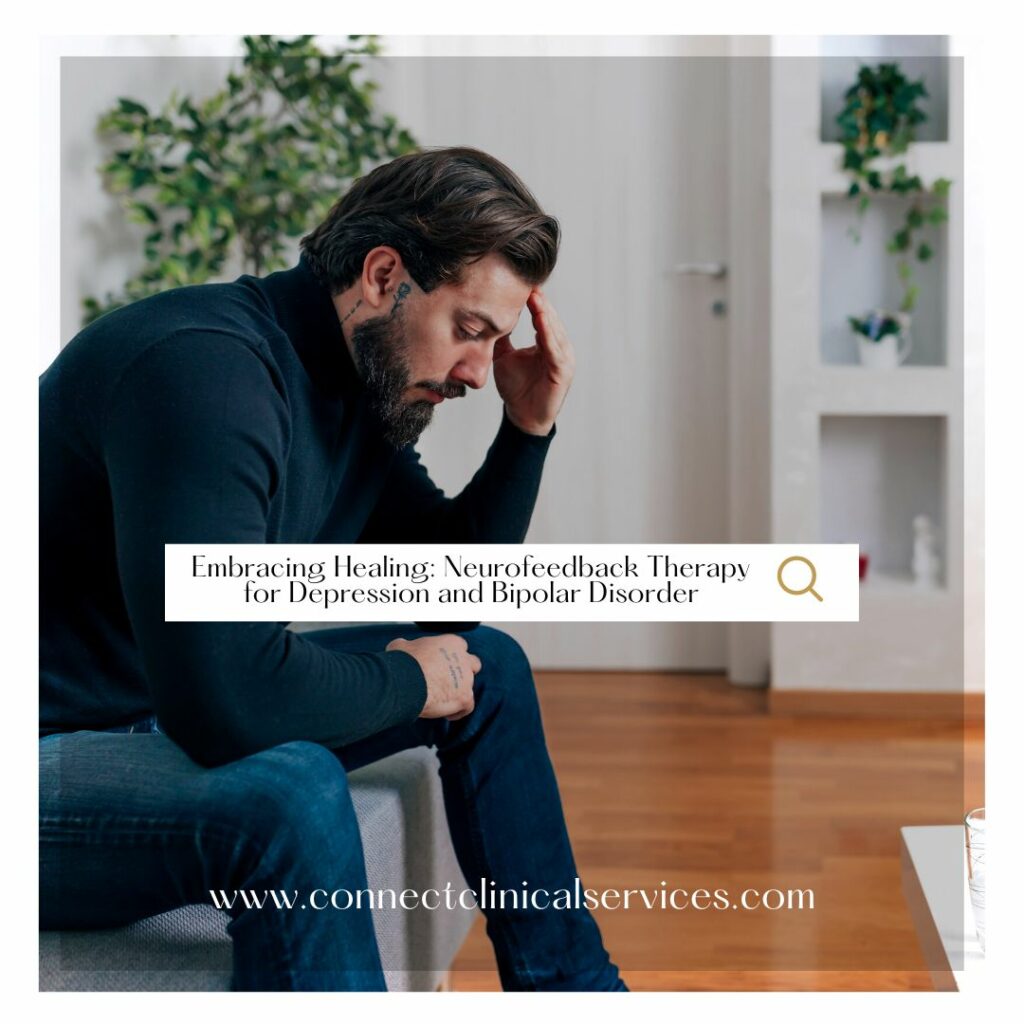Powerful Neurofeedback Therapy For Depression In Houston 24

Depression and Bipolar Disorder, two of the most prevalent mood disorders, can cast a dark cloud over one's life. They often disrupt daily routines, relationships, and overall well-being. However, the journey towards healing is not impossible. In recent years, innovative therapeutic approaches have emerged, and one such technique, Neurofeedback therapy for depression, offered by Connect Clinical Services, holds promise in helping individuals manage these challenging conditions. Discover more in this blog post on why Neurofeedback Therapy for Depression can be more beneficial for you as a solution to your mood swings.
The Difference Between Depression & Bipolar Disorder
Before diving into the potential benefits of Neurofeedback therapy, let's grasp the nature of these mood disorders.
Depression, often called Major Depressive Disorder (MDD), is characterized by persistent sadness, hopelessness, and a loss of interest or pleasure in previously enjoyed activities. It affects more than 264 million people globally, making it a leading cause of disability worldwide.
Bipolar Disorder, on the other hand, is marked by extreme mood swings, including periods of depressive lows and manic highs. These mood episodes can disrupt daily life and profoundly impact personal relationships and work.
Neurofeedback vs. Tradition Treatment for Depression
Traditional treatments for depression and bipolar disorder include medication, talk therapy (such as cognitive-behavioral therapy), and lifestyle changes. While these treatments have been effective for many, they may not work for everyone, come with side effects, or have limitations in managing the underlying brain function issues that often contribute to these disorders.
Neurofeedback therapy for depression, provided by Connect Clinical Services, offers a unique approach. It operates on the principle of neuroplasticity, the brain's ability to rewire itself. This therapy uses real-time monitoring of brainwave activity to help individuals gain control over their brain function making neurofeedback therapy for depression an effective form of treatment.
Your Average Session of Neurofeedback Therapy For Depression In Houston
- Assessment: A comprehensive assessment is conducted to understand the individual's brainwave patterns and identify areas of concern.
- Training: During training sessions, individuals receive real-time feedback on their brainwave activity through sensors placed on their scalp. They are encouraged to modulate their brainwave patterns to achieve desired states.
- Reinforcement: Positive reinforcement, such as visual or auditory cues, is provided when the individual achieves the target brainwave patterns.
- Progress Monitoring: The process is iterative, with progress continuously monitored and training adjusted as needed.
- Integration: The skills learned during neurofeedback sessions can be integrated into daily life to support ongoing self-regulation.
The 4 Benefits of Neurofeedback Therapy For Depression
The benefits that you can expect when receiving neurofeedback therapy for depression are:
A Personalized Approach: Neurofeedback therapy is highly individualized and tailored to each person's unique brain patterns and needs. This individualized approach increases the chances of success.
Reduced Reliance on Medication: For individuals with depression and bipolar disorder, neurofeedback therapy may reduce the need for medication, providing a non-pharmacological alternative or complement to traditional treatments.
Improved Emotional Regulation: Neurofeedback therapy can help individuals manage the intense emotional states often associated with these mood disorders by promoting relaxation and emotional regulation.
Long-lasting Results: Neurofeedback aims to address the root causes of depression and bipolar disorder, potentially leading to longlasting benefits beyond the treatment period.
Why Choose Connect Clinical Services for Neurofeedback Therapy?
- Expertise: The team at Connect Clinical Services comprises licensed professionals who are well-versed in neurofeedback therapy.
- Personalized Care: Your therapy plan is tailored to your unique needs, ensuring the best possible outcomes.
- Cutting-edge Technology: Connect Clinical Services utilizes state-of-the-art equipment to provide precise and effective neurofeedback therapy.
- Supportive Environment: The therapists at Connect Clinical Services offer a compassionate and supportive environment, essential for your healing journey.
Depression and Bipolar Disorder can be relentless adversaries, but they need not define your life. Neurofeedback therapy, offered by Connect Clinical Services, provides a personalized, drug-free approach to managing these conditions. By helping you gain control over your brain's functioning, it opens up new possibilities for healing, stability, and a brighter future.
Don't let these mood disorders hold you back. Embrace the potential of Neurofeedback therapy and take the first step towards a healthier, happier you. Contact us today to learn more about our approach and book your first session!

